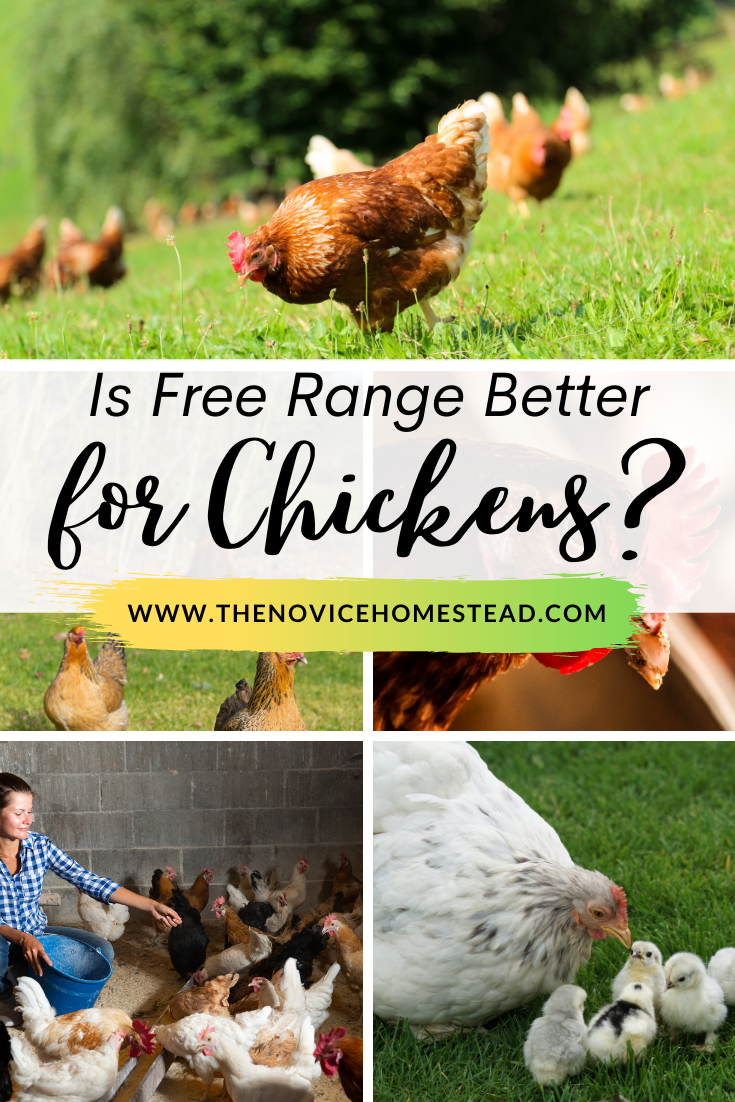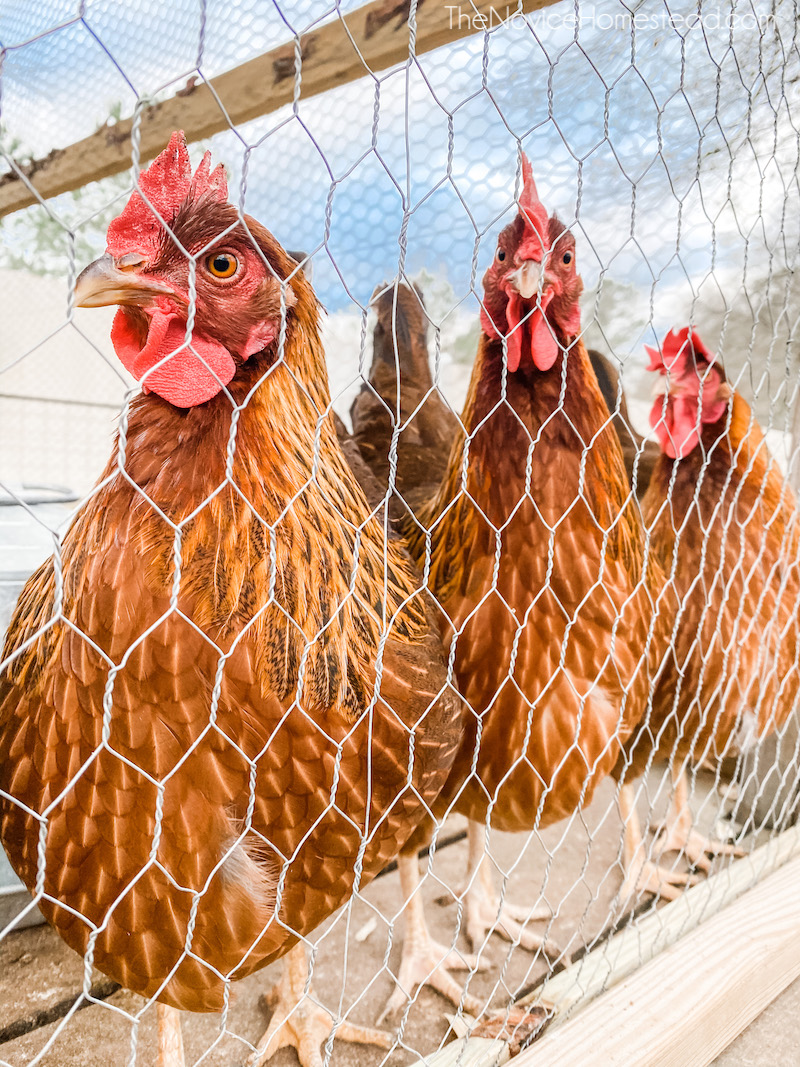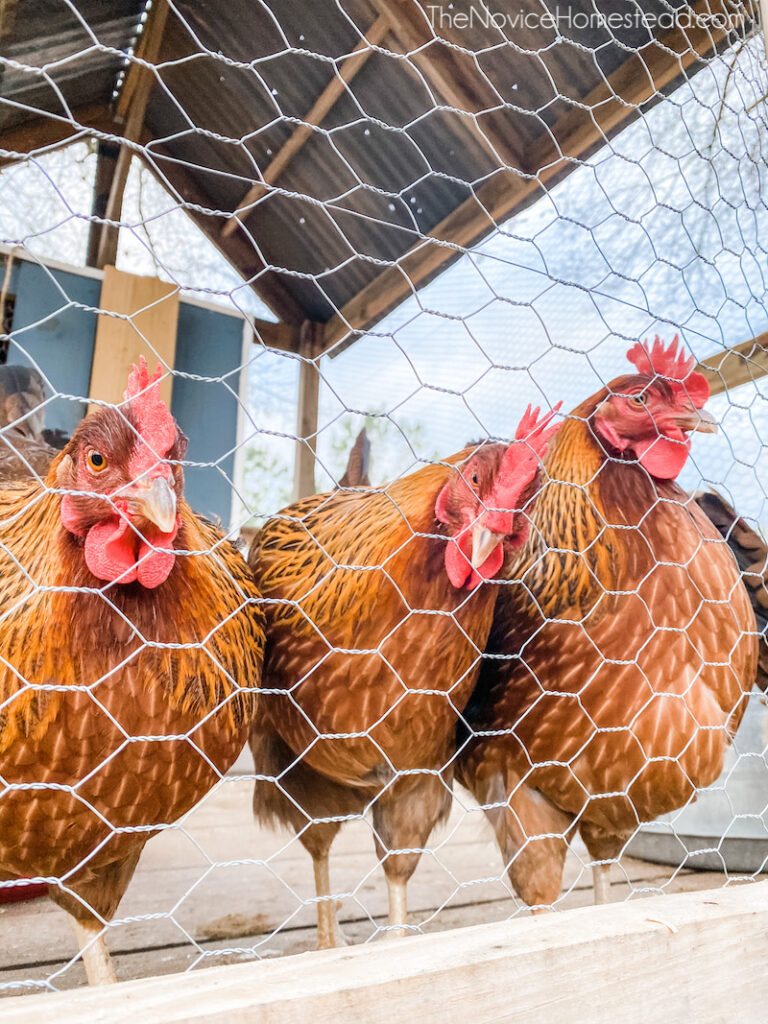When starting a flock of backyard chickens, one of the considerations is whether or not to allow them to free range. In this post I’ll break down the pros and cons of free ranging chickens.

What is a Free Range Chicken?
The USDA defines “free range” chickens as having “access” to the outdoors. In practice, this could mean that chickens have only a peephole or window!
However, that is the food industry definition, and in practice, free ranging may look very different for homesteaders or even those with backyard flocks.
In spirit, free ranging means that chickens are allowed to roam freely, outside of a coop or run, for at least part of the day.
It sounds lovely, and in theory it is! However, it may or may not be the best option for YOUR flock.
Benefits of Free Ranging Chickens
These are a few of the reasons why free ranging is a popular choice for chicken owners.
1. Chickens Eats Insects and Ticks
When I was first considering starting a small flock of chickens, I reached out to my cousin. She’d had a backyard flock for years, so I knew she’d have lots of great tips.
The first thing she told me is that chickens eat ticks. If you live in an area with a high tick population, this is especially useful!
2. Their Feed Bill Will Be Lower
Since they forage for much of their food, you’ll need to spend less on commercial feed for free range chickens.
The amount of feed needed will depend on the amount of time they spend free ranging versus in their run or coop.
3. It is Good for their Health
Free ranging can be beneficial for chickens health because they have access to natural food sources, such as insects. It can also help prevent bumblefoot if they are walking on soft soil
That being said, my flock is not free range right now, and they are all doing wonderfully.
The most important thing in any living situation is cleanliness. Chickens who live in a coop/run setup can be perfectly healthy, so long as their living quarters are kept as clean as possible.

Why Free Ranging Might NOT Be the Best Choice
Depending on your specific setup and situation, free ranging might not be ideal for you — and that’s ok! Remember, the goal is to keep healthy and happy chickens, but also to keep them alive!
1. You Live in a Neighborhood
Rules on backyard chickens vary depending on where you live. Even if you are allowed to keep a flock, you might not be allowed to let them roam freely.
Another problem with free range chickens in neighborhoods is that they may end up in a neighbor’s yard and you have to go collect them. Your neighbors may or may not be a fan of that.
2. There are a Lot of Predators
Pretty much everything loves to eat chickens. If your area has a high predator load and you do not have a dependable guard animal(s), it may be best to keep your flock secure at all times.
Common chicken predators:
- Hawks
- Owls
- Dogs
- Cats
- Coyotes
- Foxes
- Weasels
- Mink
Keep in mind, that is not a complete list. Chickens are a treat for almost any meat-eating animals.
Learn More: How to Predator Proof Your Chicken Coop
3. Your Chickens Hide their Eggs
While this is not a safety issue, it is definitely an inconvenience. Free range chickens may decide not to use their nesting boxes for laying and instead lay their eggs…anywhere!
This opens the door for losing eggs to other animals who find them before you do, or simply not being able to find them at all.
Related: How Often Do Chickens Lay Eggs?
4. They Get into Your Garden
While chickens are wonderful for eating weeds, bugs, and other unwanted things in your yard, they also love to eat garden plants.
If your garden is not secured, you may want to keep your chickens away.

How Much Space Do Chickens Need for their Run?
A general rule of thumb is 10 square feet of space per bird in their outdoor run. So if you have a 10×10′ run, you could comfortably house 10 chickens or so.
If your chickens are able to spend time outside of the run, then you can be a little less strict with the space. However, if they are always in the run (not free ranging) you won’t really want to have a run that is less than 10 square feet for each of them.
Of course, you can always give them more room if you have the space for a larger run.
In addition, your hens will need about 4 square feet of space per bird inside their coop, if you secure them in there at night.
I find that my ladies like to get cozy and are always close together, no matter the weather, so I don’t worry as much about the square footage inside the coop. The main thing is that they all have room on a perch to roost at night.
How I Keep My Chickens
My flock is not free range right now. I would love for this to be possible someday, but at current time, it is not the safest options for them.
There are two main reasons why I do not free range my chickens:
- Predators — We have quite a few potential predators in our area, likely because our property is adjacent to a forest. I am currently in the process of training two guardian dogs, but this takes time and they are not at a point where I can depend on them fully for the job.
- Neighbors — The neighbors on one side have established themselves as unfriendly. We do not know the neighbors on our other side well. It is kind of a “keep to yourself” area. If our chickens were to head over the fence to another property, I’m not sure how easy it would be to get them back.
Both of these things are big safety concerns, and to keep my flock healthy, home, and alive, I’ve chosen not to free range at this time.
I do hope in the future that I can start free ranging, at least for a few hours each day, and I am taking steps to reach that goal.
In the meantime, my girls are all healthy as can be, and that is my main priority.
I live in northern Illinois and it gets cold here but I know that chickens do not nearly lay as much when there feet get cold Also know from years of experience that when you crack a egg open for frying and you look inside the shell it should have a real small blister to be real fresh after1week that blister is already bigger That’s the best reason to tell if you purchased fresh eggs or older and if you want less cholesterol in the eggs feed them plenty of oats And in summer not too much corn
The main reason chickens do not lay as many eggs in the winter is that the days are shorter, with less daylight. Thanks for the tips!